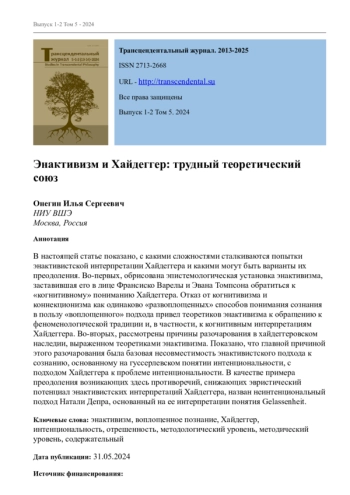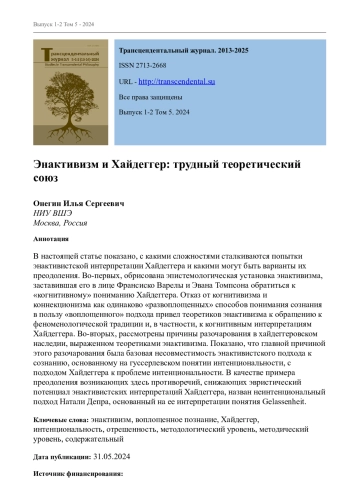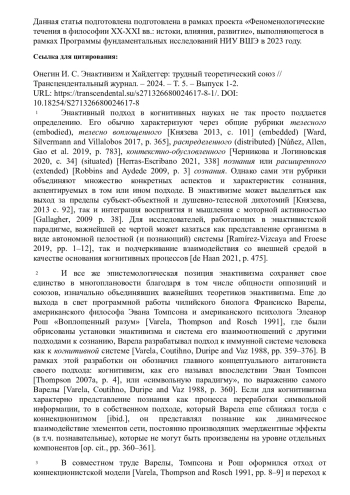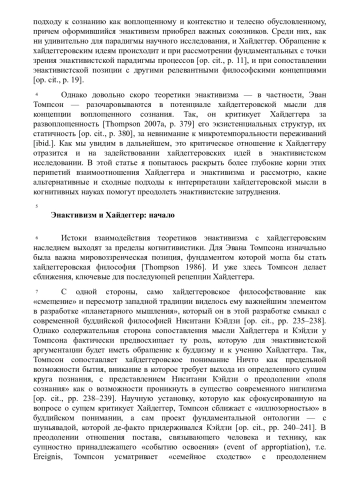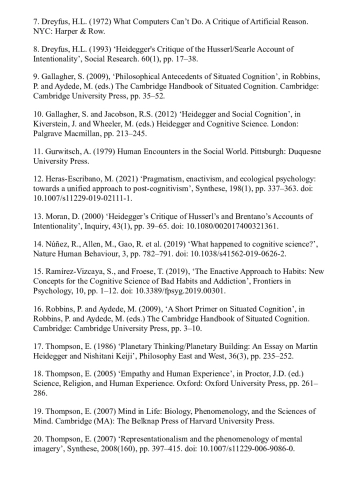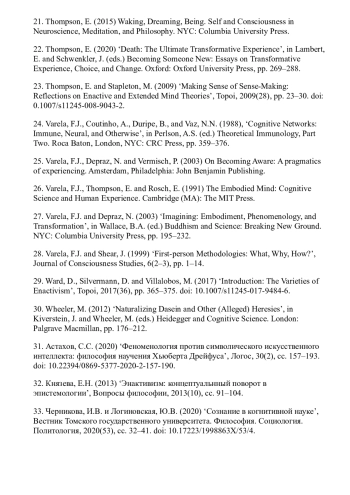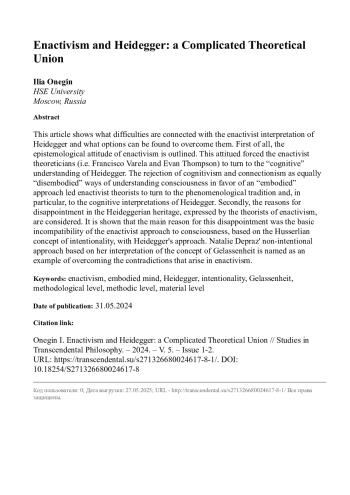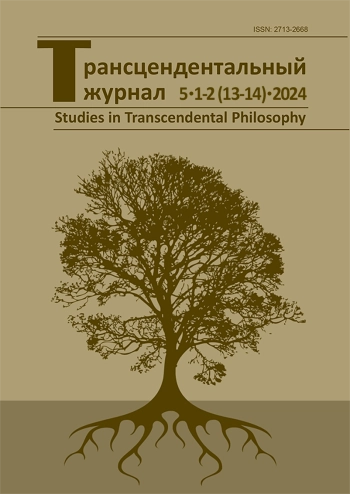В настоящей статье показано, с какими сложностями сталкиваются попытки энактивистской интерпретации Хайдеггера и какими могут быть варианты их преодоления. Во-первых, обрисована эпистемологическая установка энактивизма, заставившая его в лице Франсиско Варелы и Эвана Томпсона обратиться к «когнитивному» пониманию Хайдеггера. Отказ от когнитивизма и коннекционизма как одинаково «развоплощенных» способов понимания сознания в пользу «воплощенного» подхода привел теоретиков энактивизма к обращению к феноменологической традиции и, в частности, к когнитивным интерпретациям Хайдеггера. Во-вторых, рассмотрены причины разочарования в хайдеггеровском наследии, выраженном теоретиками энактивизма. Показано, что главной причиной этого разочарования была базовая несовместимость энактивистского подхода к сознанию, основанному на гуссерлевском понятии интенциональности, с подходом Хайдеггера к проблеме интенциональности. В качестве примера преодоления возникающих здесь противоречий, снижающих эвристический потенциал энактивистских интерпретаций Хайдеггера, назван неинтенциональный подход Натали Депра, основанный на ее интерпретации понятия Gelassenheit.
Идентификаторы и классификаторы
Энактивный подход в когнитивных науках не так просто поддается определению. Его обычно характеризуют через общие рубрики телесного (embodied), телесно воплощенного [Князева 2013, с. 101] (embedded) [Ward, Silvermann and Villalobos 2017, p. 365], распределенного (distributed) [Núñez, Allen, Gao et al. 2019, p. 783], контекстно-обусловленного [Черникова и Логиновская 2020, с. 34] (situated) [Herras-Escribano 2021, 338] познания или расширенного (extended) [Robbins and Aydede 2009, p. 3] сознания. Однако сами эти рубрики объединяют множество конкретных аспектов и характеристик сознания, акцентируемых в том или ином подходе. В энактивизме может выделяться как выход за пределы субъект-объектной и душевно-телесной дихотомий [Князева, 2013 с. 92], так и интеграция восприятия и мышления с моторной активностью [Gallagher, 2009 p. 38]. Для исследователей, работающих в энактивистской парадигме, важнейшей ее чертой может казаться как представление организма в виде автономной целостной (и познающий) системы [Ramírez-Vizcaya and Froese 2019, pp. 1–12], так и подчеркивание взаимодействия со внешней средой в качестве основания когнитивных процессов [de Haan 2021, p. 475].
Список литературы
1. de Haan, S. (2021), ‘Bio-psycho-social interaction: an enactive perspective’, International Review of Psychiatry, 33(5), pp. 471-477. DOI: 10.1080/09540261.2020.1830753 EDN: CYVUEM
2. Depraz, N., Varela, F.J. and Vermisch, P. (2000) ‘The Gesture of Awareness: An account of its structural dynamics’, in Velmans, M. (ed.) Investigating Phenomenological Consciousness: New methodologies and maps. Amsterdam, Philadelphia: John Benjamin Publishing Company, pp. 121-136.
3. Depraz, N. (2002) ‘Entre christianisme et bouddhisme: Pour une phénoménologie du corps-esprit’, Diogène, 2002(4), pp. 25-37. DOI: 10.3917/dio.200.0025
4. Depraz, N. (2003) ‘Pratiquer la réduction: la prière du coeur’, Laval théologique et philosophique, 59(3), pp. 503-519. DOI: 10.7202/008792ar
5. Depraz, N. (2006) Comprendre la phénomenologie: une pratique concrète. Paris: Armand Colin.
6. Depraz, N. and Varela, F. (2003) ‘Au cœur du temps: l’auto-antécédence II’, Intellectica, 2003(36-37), pp. 183-208. DOI: 10.3406/intel.2003.1685
7. Dreyfus, H.L. (1972) What Computers Can’t Do. A Critique of Artificial Reason. NYC: Harper & Row.
8. Dreyfus, H.L. (1993) ‘Heidegger’s Critique of the Husserl/Searle Account of Intentionality’, Social Research. 60(1), pp. 17-38.
9. Gallagher, S. (2009), ‘Philosophical Antecedents of Situated Cognition’, in Robbins, P. and Aydede, M. (eds.) The Cambridge Handbook of Situated Cognition. Cambridge: Cambridge University Press, pp. 35-52.
10. Gallagher, S. and Jacobson, R.S. (2012) ‘Heidegger and Social Cognition’, in Kiverstein, J. and Wheeler, M. (eds.) Heidegger and Cognitive Science. London: Palgrave Macmillan, pp. 213-245.
11. Gurwitsch, A. (1979) Human Encounters in the Social World. Pittsburgh: Duquesne University Press.
12. Heras-Escribano, M. (2021) ‘Pragmatism, enactivism, and ecological psychology: towards a unified approach to post-cognitivism’, Synthese, 198(1), pp. 337-363. DOI: 10.1007/s11229-019-02111-1 EDN: KLCLLB
13. Moran, D. (2000) ‘Heidegger’s Critique of Husserl’s and Brentano’s Accounts of Intentionality’, Inquiry, 43(1), pp. 39-65. DOI: 10.1080/002017400321361
14. Núñez, R., Allen, M., Gao, R. et al. (2019) ‘What happened to cognitive science?’, Nature Human Behaviour, 3, pp. 782-791. DOI: 10.1038/s41562-019-0626-2
15. Ramírez-Vizcaya, S., and Froese, T. (2019), ‘The Enactive Approach to Habits: New Concepts for the Cognitive Science of Bad Habits and Addiction’, Frontiers in Psychology, 10, pp. 1-12. DOI: 10.3389/fpsyg.2019.00301 EDN: QNKNIJ
16. Robbins, P. and Aydede, M. (2009), ‘A Short Primer on Situated Cognition’, in Robbins, P. and Aydede, M. (eds.) The Cambridge Handbook of Situated Cognition. Cambridge: Cambridge University Press, pp. 3-10.
17. Thompson, E. (1986) ‘Planetary Thinking/Planetary Building: An Essay on Martin Heidegger and Nishitani Keiji’, Philosophy East and West, 36(3), pp. 235-252.
18. Thompson, E. (2005) ‘Empathy and Human Experience’, in Proctor, J.D. (ed.) Science, Religion, and Human Experience. Oxford: Oxford University Press, pp. 261-286.
19. Thompson, E. (2007) Mind in Life: Biology, Phenomenology, and the Sciences of Mind. Cambridge (MA): The Belknap Press of Harvard University Press.
20. Thompson, E. (2007) ‘Representationalism and the phenomenology of mental imagery’, Synthese, 2008(160), pp. 397-415. DOI: 10.1007/s11229-006-9086-0
21. Thompson, E. (2015) Waking, Dreaming, Being. Self and Consciousness in Neuroscience, Meditation, and Philosophy. NYC: Columbia University Press.
22. Thompson, E. (2020) ‘Death: The Ultimate Transformative Experience’, in Lambert, E. and Schwenkler, J. (eds.) Becoming Someone New: Essays on Transformative Experience, Choice, and Change. Oxford: Oxford University Press, pp. 269-288.
23. Thompson, E. and Stapleton, M. (2009) ‘Making Sense of Sense-Making: Reflections on Enactive and Extended Mind Theories’, Topoi, 2009(28), pp. 23-30. doi: 0.1007/s11245-008-9043-2. EDN: DSCSOB
24. Varela, F.J., Coutinho, A., Duripe, B., and Vaz, N.N. (1988), ‘Cognitive Networks: Immune, Neural, and Otherwise’, in Perlson, A.S. (ed.) Theoretical Immunology, Part Two. Roca Baton, London, NYC: CRC Press, pp. 359-376.
25. Aware: A pragmatics of experiencing. Amsterdam, Philadelphia: John Benjamin Publishing.
26. Varela, F.J., Thompson, E. and Rosch, E. (1991) The Embodied Mind: Cognitive Science and Human Experience. Cambridge (MA): The MIT Press.
27. Varela, F.J. and Depraz, N. (2003) ‘Imagining: Embodiment, Phenomenology, and Transformation’, in Wallace, B.A. (ed.) Buddhism and Science: Breaking New Ground. NYC: Columbia University Press, pp. 195-232.
28. Varela, F.J. and Shear, J. (1999) ‘First-person Methodologies: What, Why, How?’, Journal of Consciousness Studies, 6(2-3), pp. 1-14.
29. Ward, D., Silvermann, D. and Villalobos, M. (2017) ‘Introduction: The Varieties of Enactivism’, Topoi, 2017(36), pp. 365-375. DOI: 10.1007/s11245-017-9484-6 EDN: HUTYTI
30. Wheeler, M. (2012) ‘Naturalizing Dasein and Other (Alleged) Heresies’, in Kiverstein, J. and Wheeler, M. (eds.) Heidegger and Cognitive Science. London: Palgrave Macmillan, pp. 176-212.
31. Астахов, С.С. (2020) ‘Феноменология против символического искусственного интеллекта: философия научения Хьюберта Дрейфуса’, Логос, 30(2), сс. 157-193. DOI: 10.22394/0869-5377-2020-2-157-190
32. Князева, Е.Н. (2013) ‘Энактивизм: концептуальнный поворот в эпистемологии’, Вопросы философии, 2013(10), сс. 91-104.
33. Черникова, И.В. и Логиновская, Ю.В. (2020) ‘Сознание в когнитивной науке’, Вестник Томского государственного университета. Философия. Социология. Политология, 2020(53), сс. 32-41. Х/53/4. DOI: 10.17223/1998863
Выпуск
Другие статьи выпуска
В тексте производится краткий обзор ежегодной научной конференции «Анахарсис», которая состоялась в сентябре 2023 г. Автор представляет основную тематику конференции, делая акцент на роли трансцендентального подхода при осмыслении возможности Другой философии.
С 11 по 13 апреля 2024 года в Москве проходила 9-я ежегодная Международная научная конференция (семинар) «Трансцендентальный поворот в современной философии - 9: метафизика, эпистемология, теория сознания, когнитивистика и искусственный интеллект, теология». В центре внимания трансцендентального семинара - 2024 находились актуальные и инновационные идеи трансцендентальной когнитивистики и искусственного интеллекта. Также в работе семинара нашли отражение метафизическая, эпистемологическая и теологическая трансцендентальная проблематика.
ТРАНСЦЕНДЕНТАЛЬНЫЙ ПОВОРОТ, МАКСИМЫ МЫСЛИ, ОНТОЛОГИЧЕСКОЕ ДОПУЩЕНИЕ, ИСКУССТВЕННЫЙ ИНТЕЛЛЕКТ, СОЗНАНИЕ
В статье осмысливаются методологические основания нейротрансцендентализма, обсуждается вопрос о том, насколько последовательно и эффективно он интегрирует подходы трансцендентальной философии и нейронаук. Исследование проведено на базе сравнительного анализа того, как пространственно-временные и количественные репрезентации осмысливаются в философии Канта и в трансцендентально ориентированных нейроисследованиях. Автор приходит к выводу, что 1) моментом демаркации является нечувствительность трансцендентализма к материальному корреляту априорных принципов разума, обнаружение которых принципиально для нейронауки; 2) в интегрируемых дисциплинах имеются существенные расхождения содержательных полей ключевых понятий (a priori, репрезентация, пространство, время, количество, восприятие и т. п.); 3) нейронауки и трансцендентальная философия имеют основания для интеграции на уровне их предметной области; 4) нейротрансцендентализм образует интердисциплинарную область исследований, порождающую собственный синтетический объект изучения - «биологическое a priori».
Kant talks about a transcendentally necessary mind and, less often, about an intelligible mind. The two characterizations of the mind have similarities. However, there are also important differences. The properties grouped under ‘transcendental’ are cognitive, those grouped under ‘intelligible’ are conative. The properties grouped under ‘transcendental’ are nearly all congenial to cognitive science. Many grouped under ‘intelligible are not.
In exact epistemology Immanuel Kant’s statement on the priority of application of cognitive faculties is detailed as an intellectual process. Empirical regularities of the JSM-method of automated support for research are synthetic a posteriori judgements. Theoretical intelligence is primary, and its aspects are understanding (Verstand) and mind (Gemüt). The conditions of possible experience in Kant’s sense are implemented in the JSM-method of ASR in intelligent systems. And the JSM-method itself is the transcendental logic of artificial intelligence using two theories of truth, the coherence theory and the correspondence theory. Exact epistemology, which is exact neo-Kantianism, can be naturally considered as a reflection of information society culture on its civilizational (technological) aspects.
В одной из своих работ современный нейрофилософ Г. Нортхофф, развивая проблематику кантовской трансцендентальной когнитивистики (эпистемологии), вводит метафору кантовского ума. В нашей статье мы предложим экспликацию метафоры кантовского ума и на этой основе разовьем когнитологическую модель кантовского ума (кантовский ум как последовательность познавательных синтезов) с целью ее применения в современных исследованиях по когнитивистике, нейронаукам и искусственному интеллекту. Вместе с тем в настоящее время стоит вопрос (задача), с одной стороны, о переходе трансцендентализма к нейротрансцендентализму, т. е. развитии нейрокогнитологических исследований, направленных на выявление нейронных коррелятов компонентов и структур кантовского ума, а, с другой стороны, о создании интеллектуальных компьютерных программ (систем), реализующих кантианскую когнитологическую модель ума. Данная статья намечает пути решения как первой, так и второй из этих задач.
Статистика статьи
Статистика просмотров за 2025 - 2026 год.
Издательство
- Издательство
- ГАУГН
- Регион
- Россия, Москва
- Почтовый адрес
- 119049, г Москва, р-н Якиманка, Мароновский пер, д 26
- Юр. адрес
- 119049, г Москва, р-н Якиманка, Мароновский пер, д 26
- ФИО
- Промыслов Николай Владимирович (ИСПОЛНЯЮЩИЙ ОБЯЗАННОСТИ РЕКТОРА)
- Контактный телефон
- +7 (___) _______
